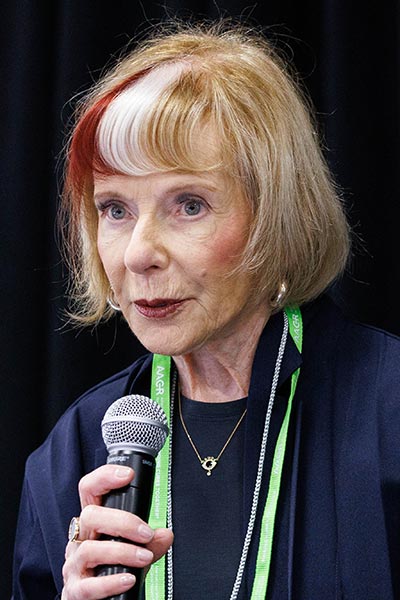Radiation oncology researcher receives Charlotte Friend Lectureship award
//
Estimated Read Time:

The AACR-Women in Cancer Research Charlotte Friend Lectureship award for 2024 was presented to Elizabeth Travis, PhD, in recognition of her trailblazing research on the effects of radiation on normal tissues, as well as for her devotion to championing women in science and medicine.
Travis delivered her award lecture, Science and Advocacy: A Career in Cancer Research, on Monday, April 8, at the American Association for Cancer Research (AACR) Annual Meeting 2024 in San Diego. The session is available on demand for registered Annual Meeting attendees through July 10, 2024, on the virtual meeting platform.
Travis, professor in the Department of Experimental Radiation Oncology at the University of Texas MD Anderson Cancer Center, said it was deeply meaningful to receive the award, which was established to honor the late Charlotte Friend, PhD, a former AACR President and pioneer in cancer research.
“It’s an honor and a privilege to give this talk on her, in her name,” Travis said. “It’s also deeply humbling that I’m speaking about somebody who did so much when it was not popular to do that much.”
The AACR-Women in Cancer Research Charlotte Friend Lectureship recognizes a remarkable scientist who has both made notable contributions to cancer research and promoted the growth of women in science, whether by leadership or example.
Travis spoke about her professional background, including the mentors and colleagues who helped her along the way, and stressed the importance of sponsorship in advocating for others in their career. She also touched on the professional doors that one can open by leaning into new opportunities.
“My advice to all of you who are more junior in this audience and haven’t gotten this message and don’t know how to own it: You don’t get what you don’t ask for,” said Travis. “Put that up on your screen, on your monitor, please. And think about that every time you’re not going to ask about something.”
Travis has been a longtime advocate for women and minority cancer researchers by providing training and leadership and by helping to implement institutional changes.
“As you go throughout your career and you’re more senior, you sit on committees,” she said. “I started to think about how do I help, for example, looking at our promotion tenure processes? How do we consider doing a better job of salary equity analysis? How do we do a better job at our searches on choosing leaders?”
Travis joined the University of Texas MD Anderson Cancer Center in 1982. She was elected to the Board of Directors for the American Society of Therapeutic Radiology and Oncology (ASTRO, now the American Society of Radiation Oncology) and was appointed as MD Anderson’s first associate vice president for women faculty programs—now called Faculty Diversity, Equity, and Inclusion.
Travis’ research findings have resulted in improvements in the use of radiation in patient care through her understanding of complications that can arise from radiation therapy. She is a recognized Fellow of ASTRO and a Fellow in the inaugural class of the Radiation Research Society. With over 125 authored and co-authored publications, she is considered a skilled expert in the field of pulmonary complications of radiotherapy. Travis earned her bachelor’s degree in biology from Indiana University of Pennsylvania, as well as a master’s degree from the University of Pittsburgh and a doctorate in Experimental Pathology and Radiation Biology from the Medical University of South Carolina.




